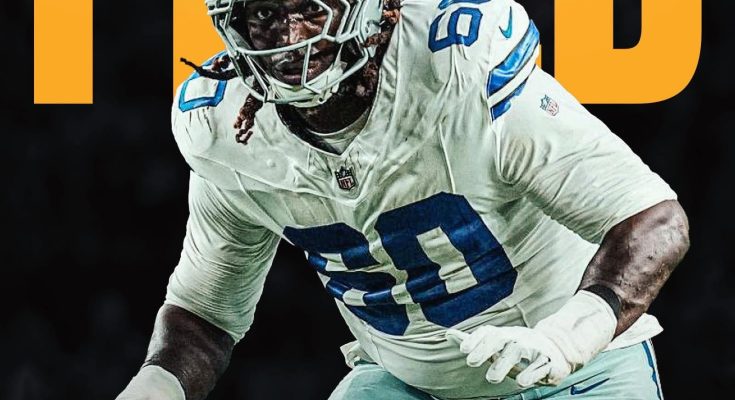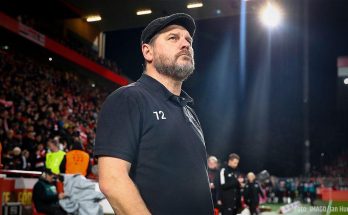The NFL has always prided itself on being a league that balances toughness with discipline, and once again that balance is being tested after news broke that Dallas Cowboys rookie left tackle Tyler Guyton has been fined \$12,172 for striking Philadelphia Eagles outside linebacker Jalyx Hunt in the head during last Thursday night’s highly intense divisional matchup. What makes this incident more intriguing is the fact that no penalty was actually called on the play at the time, leaving fans, analysts, and even some players debating whether the fine was justified or if the league is once again overstepping in its enforcement of postgame discipline. Guyton has already made it clear that he plans to appeal the fine, setting up what could become another discussion on how the NFL handles discipline, fairness, and consistency.
To fully understand the significance of this situation, it’s important to revisit the circumstances surrounding the incident. The Cowboys-Eagles rivalry is one of the most heated in football, a matchup that often produces hard hits, high stakes, and plenty of emotions spilling over. Last Thursday was no different. In the middle of one of the game’s pivotal sequences, tensions rose between Guyton, the Cowboys’ highly touted rookie left tackle out of Oklahoma, and Hunt, a young edge rusher for the Eagles looking to establish himself in Philadelphia’s defense. The two had been battling physically throughout the game, with Guyton tasked with protecting Dak Prescott’s blind side against one of the league’s most relentless defensive fronts. According to those watching closely, Hunt had been trying to set the tone with his physicality, and Guyton, who is still adjusting to the NFL’s speed and intensity, may have reacted emotionally in the heat of the battle.
The strike itself happened in a brief but noticeable flash. After a snap, as Prescott delivered the ball, Guyton appeared to extend his arm and made contact with Hunt’s helmet in a way that the league later deemed unnecessary and dangerous. Referees, however, did not throw a flag for unnecessary roughness or hands to the face. The play moved on without a hitch, and at the time, it didn’t stand out as anything that demanded immediate punishment. But upon review, the league office, which routinely examines game film for disciplinary issues missed in real-time, decided Guyton’s action warranted financial punishment. Thus, the rookie lineman was docked \$12,172 from his paycheck.
Guyton’s response has been firm and clear: he will appeal. For a young player trying to establish himself not only as a starter but also as a long-term franchise cornerstone on Dallas’s offensive line, his reputation matters. Guyton is not known as a dirty player; in fact, much of the pre-draft scouting process highlighted his discipline, footwork, and maturity. That’s part of why the Cowboys felt confident drafting him to replace longtime starter Tyron Smith. So when the fine was announced, Guyton wasted little time in signaling that he believes the punishment was not only excessive but also unwarranted given that no penalty was flagged during the game itself. For him, the appeal is not just about the money—though \$12,172 is not insignificant for a rookie still on his first contract—it’s also about protecting his image as a clean player.
The broader discussion around the fine ties into the ongoing debate about how the NFL polices on-field behavior. Critics of the league’s disciplinary system often argue that it’s inconsistent. One week a player might be fined for something minor, while in another game a seemingly more egregious infraction goes unpunished. Fans of the Cowboys have already pointed to instances where opposing defenders hit Prescott high or low without drawing a fine afterward, and they see this as another case of the NFL targeting Dallas unfairly. Eagles fans, on the other hand, have taken a more measured view, with some acknowledging that Hunt did appear to take a questionable blow but also noting that the fine seems harsh given the context. The divide reflects the broader tribalism of the sport: every fanbase interprets league discipline through the lens of their loyalty.
What complicates matters is the rivalry itself. Cowboys-Eagles games are notorious for their edge, and players on both sides know they are under the microscope when tempers flare. The NFL has to walk a tightrope: they don’t want to take away the physicality and intensity that make the sport appealing, but they also can’t allow actions that endanger player safety, particularly when it comes to head contact. Striking another player in the helmet, even unintentionally, has become a sensitive area given the league’s ongoing battles with concussions and head trauma. For that reason, even minor instances draw attention. Guyton may not have intended to do harm, but the optics of striking Hunt in the head were enough for the league to act.
From a Cowboys perspective, the fine comes at an inconvenient time. The offensive line is already under scrutiny as Prescott tries to lead Dallas to a division title in one of the most competitive NFC East races in recent memory. Guyton, as a rookie, is being asked to step into one of the toughest jobs in football: protecting the blind side against elite pass rushers like Haason Reddick, Josh Sweat, and in this case, Hunt. Mistakes are part of the learning curve, but any perception of undisciplined behavior adds another layer of pressure on him. Cowboys head coach Mike McCarthy has publicly supported his young tackle, though he stopped short of criticizing the league directly. Behind the scenes, though, Dallas brass knows they need Guyton to remain steady both on the field and in the court of public opinion.
On the Eagles’ side, Hunt has not publicly commented on the fine, though his teammates have reportedly praised his composure in the moment. For Hunt, the incident could actually serve as a strange form of validation: if an opponent felt the need to strike him, it suggests he was doing his job effectively and getting under his opponent’s skin. For Philadelphia’s defense, this becomes another example of their ability to dictate terms in the trenches. The Eagles thrive on overwhelming offensive lines and forcing them into mistakes, and whether intentional or not, Guyton’s strike fits that narrative.
The appeal process itself could be telling. Appeals are heard by an independent officer jointly appointed by the NFL and NFLPA, which means Guyton will have a chance to present his case. If video evidence shows the strike was more incidental than malicious, there is a possibility the fine could be reduced or even overturned. However, history shows that most appeals result in the fine being upheld. Still, even if Guyton doesn’t win the appeal, going through the process allows him to make a statement about his intent and character, which could matter long-term.
This incident also highlights the financial realities of being an NFL rookie. For veterans with multi-million-dollar contracts, a fine of just over \$12,000 might not seem significant. But for rookies, particularly those not taken in the top half of the first round, it represents a noticeable hit to their earnings. Guyton is still adjusting to life in the NFL, and losing that chunk of money stings. Beyond finances, though, the rookie year is about building trust—with coaches, teammates, and fans. A fine, even if disputed, complicates that process.
From a narrative standpoint, this fine may eventually become a footnote in Guyton’s career, but right now it’s a defining moment. If he bounces back, avoids further incidents, and develops into the dominant left tackle Dallas envisions, this episode will be remembered as part of his learning curve. If, however, he struggles with penalties or discipline, critics will point back to this as an early warning sign. That’s why his appeal and his conduct moving forward are so important.
In the bigger picture, the NFL continues to wrestle with how to enforce discipline consistently. Every season brings cases like this, where fans argue about whether the league overreacted or whether referees should have caught it in real-time. The tension between letting players play hard and protecting their safety isn’t going away. Tyler Guyton’s fine is just the latest spark in that ongoing debate, one that will likely intensify as the season wears on and more incidents inevitably occur.
For now, Cowboys fans will rally behind their rookie, hoping the appeal goes in his favor, while Eagles fans will simply see it as justice for a hit that shouldn’t have happened. In the middle of it all is Guyton himself, a young man trying to balance the pressures of life as an NFL lineman with the expectations of playing for one of the league’s most scrutinized franchises. His next moves, both on and off the field, will be watched closely—not just by Dallas, but by the entire league.
What’s undeniable is that this fine, whether upheld or not, adds another layer to the already fiery Cowboys-Eagles rivalry. Every time these two teams meet, sparks fly, and this latest episode ensures that the next matchup will be even more emotionally charged. For the NFL, that means more headlines, more attention, and more fans tuning in, proving once again that even moments of controversy can fuel the drama that makes football the most compelling sport in America.



